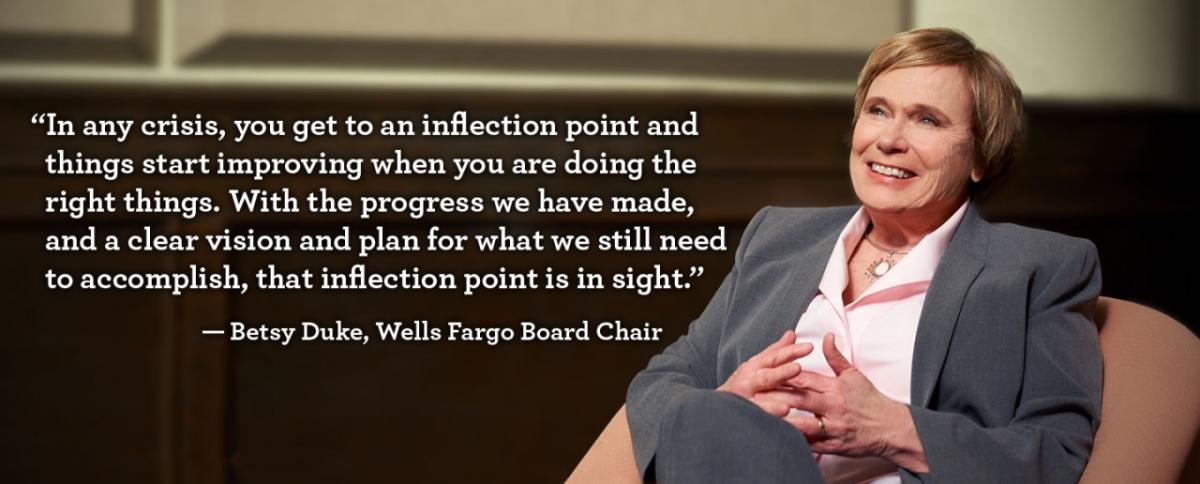Betsy Duke — A Career of Firsts in Leadership
Amid crises and accomplishments, Wells Fargo Chair Betsy Duke has forged a career of firsts, culminating with being named the first female chair of a major U.S. bank.

Betsy Duke — A career of firsts in leadership
As she relaxed on a Saturday afternoon in 1991, Betsy Duke received a phone call that would change her life. Her mentor and boss at a community bank in Virginia, the Bank of Tidewater, had died from a heart attack. Twenty-four hours later, Duke became one of the state’s first female banking CEOs.
Duke took the helm at that bank during the country’s savings and loan crisis — at that time the biggest threat to the U.S. financial system since the Great Depression. Despite some sleepless nights, she said she gained insights that have guided her career ever since.
“At first, I was worried all the time about our loan portfolio and what could potentially go wrong,” Duke recalled. “But I learned that the first thing you do in a crisis is to deal with reality the way it is, not get caught up in the angst of ‘Why is this happening to me?’ You have to pay attention to the way forward, dealing calmly with every challenge as it comes along.”
The 65-year-old native of the Virginia Beach, Virginia, area said she has drawn from that and other experiences in taking on the job of Wells Fargo’s independent board chair. On Jan. 1, roughly three years after joining the board, Duke succeeded the retiring Stephen Sanger — and became the first woman to chair one of the largest banks in the country.
A trailblazer in banking
Duke is stepping into her new role at a key juncture for Wells Fargo, as it navigates one of the most challenging eras in its history and enters the second full year of rebuilding trust amid sales practices issues.
The new role also marks the latest in a career of firsts for Duke: She was the first woman to head the Virginia Bankers Association (1999) and the American Bankers Association (2004). In 2008, she was appointed to the Federal Reserve Board of Governors, joining the Fed as the financial crisis exploded and the stock market crashed. She was the seventh of nine women to have ever been appointed to the Fed in its history.
Duke’s expertise and decision-making influence at the Fed during that extraordinary and controversial period helped establish her credentials on a national scale, drawing praise from some top leaders in the financial services industry.
Duke said being a veteran of crises has equipped her well for leading Wells Fargo’s board during this period. She promised heightened oversight of the company, but also gave a vote of confidence in its commitment to address its problems, implement solutions, work to compensate customers, and rally team members.
After only a month on the job, however, Duke faced some new challenges for Wells Fargo as it agreed to a cap on asset growth as part of an enforcement action by the Federal Reserve Board.
Amid the latest developments, Duke said the company must redouble its efforts to fix the problems, while not allowing them to overshadow the real progress Wells Fargo is making in dealing with mistakes of the past and building a better bank for now and the future.
“There should be no doubt about the commitment of our board and company leaders to meet the highest expectations of regulators, shareholders, customers, team members, and the community,” she said. “Every change we’ve made to date is geared to reflect that commitment.”
She also voiced strong support for Wells Fargo CEO Tim Sloan, who she said has provided steady, determined leadership and positive change.
The highest priority during a time of crisis is “you have to choose the right leader,” she said. “And I believe we have the right leader for Wells Fargo.”
From theater to teller: More than acting
From the early years of her life, Duke appeared destined to take the road less traveled in her career pursuits — as defined by then-traditional roles for women. Her father, a building contractor, had three daughters and no sons, so he groomed his math-minded daughter to be “the first woman contractor,” Duke recalled.
By college, however, her independent streak took hold: She entered North Carolina State University majoring in physics, but quickly gravitated to theater — fascinated by drama, stagecraft, and audience dynamics. After a year, she transferred to the University of North Carolina at Chapel Hill and eventually graduated with a fine arts and drama degree.
After a stint in various theater productions, Duke took a part-time job as a bank teller, where she says she found her real calling. Her analytical skills quickly propelled her from balancing checkbooks as a new accounts clerk to leading the bank’s money management functions.
“Everything about banking just made sense; it was intuitive for me,” she said. “I could envision the way funds moved around a balance sheet. I had a talent for it. It used to drive my CFO crazy because I would look at a number they showed me and would immediately know it didn’t look right. Then they would have to dig around to find out what had happened in the accrual process.”
The personal relationships of banking also came naturally to her; her knack for theater craft became a great resource, Duke said.
“In the theater, one of the things they teach you is body language: reading and understanding how people are reacting to you,” she said. “So much of banking is just a relationship business. It is eye contact; how you deal with people, and how you think about people. So, for me, drama and banking go together well, though it’s not immediately obvious they’d be a good match.”
Gradual path to change
Duke’s rise to senior management came very gradually, she said. As a woman, she was on a path few others had trod at the time. There were many hurdles to clear and attitudes to change, including some men who refused to work for a woman.
But a number of other men became key allies along the way in the 1980s, especially Burt Harrison, CEO of the Bank of Tidewater, who became her mentor.
Duke said Harrison played a central role in her career breakthrough, persuading the initially resistant board to name her president of the bank in the late ‘80s — a job that she was already performing, for all practical purposes. Several years later, when Harrison died suddenly during a golfing trip, Duke succeeded him as CEO. The bank was eventually acquired by SouthTrust, which later became part of Wachovia, where Duke was an executive vice president and worked in the merger office for more than a year.
“Among my fellow bankers, I always felt a great collegiality and respect,” she said. “Once you reach a certain level as a woman, you become somewhat of a role model and representative of what women can do. It changes the dynamic quite a bit.”
That experience has also made Duke a major advocate for diversity and gender equality in the professional world, particularly in banking. She approaches her advocacy using tact, patience, persistence, and well-timed assertiveness — an approach, she said, that has helped her break down barriers in her career.
“There was a time, after Burt died, when I was trying to hire senior loan officers, and a couple of men just couldn’t bring themselves to work for a woman, or at least they didn’t want to work for me,” she said. “Ultimately, however, I did hire a number of men, and, to a person, they’ve all come back to me later and said it was the best job they ever had.”
Reaching an inflection point
From community banking to corporate banking, industry trade groups to regulatory leadership, Duke brings a depth of savvy and expertise to Wells Fargo’s boardroom, said Sloan. “We are fortunate to have someone of her caliber and experience to assume this role at this time of transition,” he said.
“Betsy has made invaluable contributions to the Federal Reserve and to the country,” then-Fed Chairman Ben Bernanke said in a statement when Duke resigned from the board in 2013. “She brought fresh ideas grounded in her deep knowledge of the banking industry and the real-world dynamic between borrowers and lenders.”
Mary Jo White, former head of the Securities and Exchange Commission, welcomed Duke’s leadership of Wells Fargo’s board when she was elected chair last August.
“She exudes real credibility not only with investors and her fellow board members, but also regulators,” White told Bloomberg in August 2017. Now a partner at law firm Debevoise & Plimpton LLP, White oversaw the Fed’s annual self-evaluation.
Duke said she comes to the job with eyes wide open to the challenges the board and the company are facing in resolving the sales practices issues.
“I’ve been in the regulators’ shoes. I understand the pressure that is on them. They have to do what they have to do. And we will work with them. But our objective is not just to chin the bar of regulatory expectations, but to go further and become an industry leader in risk management.”
Amid the adversity, however, Duke has confidence the company has laid the right foundation and will regain the trust of all stakeholders.
“In any crisis, you get to an inflection point and things start improving when you are doing the right things,” she said. “With the progress we have made, and a clear vision and plan for what we still need to accomplish, that inflection point is in sight.”

